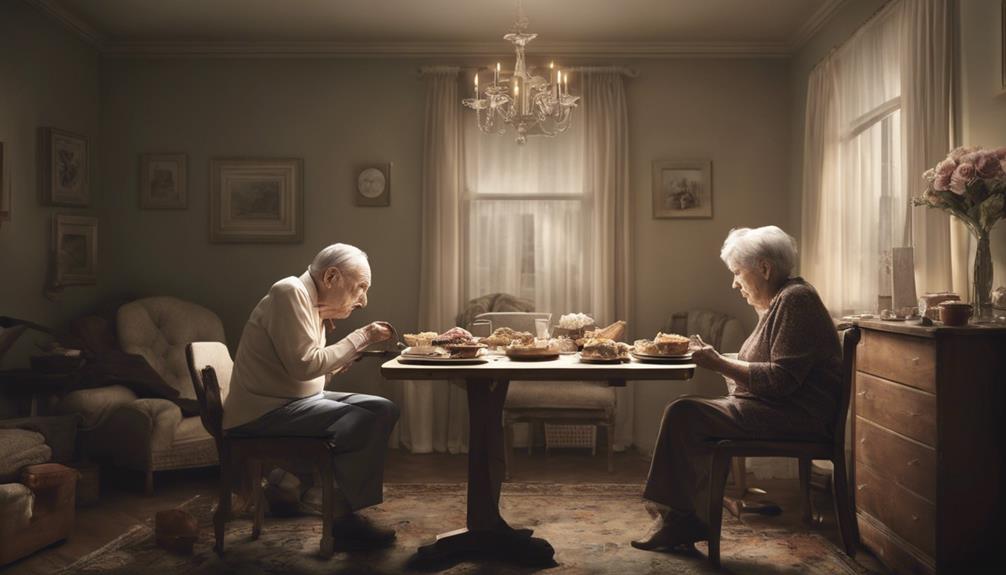When taking care of a family member with dementia, it is important to handle situations with kindness and understanding. Nonetheless, some actions may unintentionally lead to confusion or distress.
By being mindful of these potential pitfalls, you can create a more supportive and harmonious environment for both you and your loved one. Stay tuned to uncover the essential 'dos and don'ts' that can make a significant difference in your caregiving journey.
Key Takeaways
- Validate and support their feelings to build emotional connection.
- Avoid arguments and corrections, focus on empathy and understanding.
- Simplify communication and tasks with clear, concise instructions.
- Prioritize self-care and seek support to prevent burnout and maintain well-being.
Invalidating Their Feelings
When interacting with loved ones who've dementia, it's crucial to avoid invalidating their feelings to maintain emotional well-being and foster a strong connection with them. Dementia can bring about changes in behavior and emotions, making it essential to handle situations delicately.
Each person with dementia experiences a unique journey based on the type of dementia they have. It's vital to recognize that their feelings, even if they seem irrational or disconnected from reality, are valid and real to them. Dismissing or ignoring their emotions can lead to feelings of isolation and frustration, hindering effective communication.
Instead, acknowledging and validating their feelings can enhance trust and strengthen the caregiver-patient relationship. Phrases like 'You shouldn't feel that way' can be harmful; showing empathy and understanding through compassionate support and reassurance can provide comfort and security to your loved one with dementia.
Arguing or Correcting Them

To maintain a positive and supportive relationship with your loved one living with dementia, it's crucial to refrain from arguing or correcting them. These actions can lead to increased confusion, distress, and communication breakdown. Engaging in arguments or correcting their statements can be detrimental to their well-being and the relationship you share.
Here are some key points to remember when interacting with your loved one with dementia:
- Validate their feelings: Instead of correcting them, acknowledge their emotions and experiences.
- Focus on connection: Building a strong emotional connection is more important than proving them wrong.
- Redirect the conversation: If a disagreement arises, gently steer the conversation towards a different topic to avoid conflict.
Overloading With Information
Avoid overwhelming your loved one with dementia by keeping information shared with them simple and concise to prevent confusion and cognitive overload. Providing too much information can lead to cognitive strain and make it challenging for them to grasp the message. Limit the amount of information you share at once, focusing on clear instructions that are easy to understand. Simple communication is key when interacting with someone with dementia to ensure they can process the information effectively.
Remember to avoid bombarding them with multiple questions or tasks simultaneously, as this can cause frustration and agitation. By providing clear and concise instructions one step at a time, you can facilitate better communication and reduce stress for your loved one. Keep in mind that simplicity and clarity are essential when interacting with individuals with dementia, helping them feel supported and understood in their daily interactions.
Rushing or Pressuring Them

To prevent increased confusion and frustration, it's crucial to refrain from rushing or pressuring your loved one with dementia as they navigate tasks at their own pace. Here are some essential points to consider:
- Allow Time: Giving your loved one the time they need to complete tasks can help maintain their independence and dignity.
- Avoid Pressure: Pressuring them to remember or perform tasks quickly can lead to anxiety and agitation, making the situation more challenging.
- Practice Patience: Patience and understanding are vital when interacting with a loved one with dementia. It can help reduce stress and tension for both of you.
Neglecting Self-Care and Support
Neglecting your own self-care and support while caring for a loved one with dementia can significantly impact your well-being and ability to provide quality care. It's essential to prioritize your physical and emotional well-being to prevent burnout and increased stress. Seeking support from friends, family members, or support groups is crucial. This can help prevent feelings of isolation and maintain your mental health. Remember, taking breaks and utilizing respite care services are not signs of weakness but necessary for recharging and preventing overwhelm. Additionally, incorporating self-care practices like exercise, meditation, and hobbies into your routine can help you manage the challenges of caring for someone diagnosed with dementia.
| Self-Care Practices | Description | Benefits |
|---|---|---|
| Exercise | Regular physical activity to reduce stress | Boosts mood and energy levels |
| Meditation | Mindfulness practice to calm the mind | Reduces anxiety and improves focus |
| Hobbies | Engaging in enjoyable activities outside caregiving | Promotes relaxation and creativity |
Frequently Asked Questions
What Are 3 Things to Never Do With Your Loved One With Dementia?
When caring for a loved one with dementia, it's crucial to approach the situation with empathy and patience. Never use harsh language, ignore their feelings, or rush them. Instead, focus on being understanding and validating their emotions. Avoid arguing, correcting, or pressuring them to remember. Create a calm and supportive environment, steering clear of bringing up distressing memories. Your kind and compassionate approach can have a significant impact on their well-being and comfort.
Your understanding and compassion can make a significant difference in their well-being and comfort.
Is It Better to Keep Someone With Dementia at Home?
When caring for someone with dementia, keeping them at home can offer comfort and stability. Familiar surroundings help reduce confusion and provide a sense of security. Personalized care and routines tailored to their needs can enhance their quality of life.
While each situation is unique, many individuals with dementia benefit from staying in a familiar environment with consistent support. It's a way to maintain connections to their memories and surroundings, fostering independence and well-being.
Can You Leave a Person With Dementia Home Alone?
You should never leave a person with dementia home alone due to safety concerns. Forgetting essential tasks, confusion, and wandering behaviors can lead to accidents or getting lost.
It's crucial to explore alternative options like in-home care or adult day programs to ensure their well-being. Prioritize their safety and consider professional help to provide the necessary support and supervision they need.
What Is the Average Age of Death for Someone With Dementia?
You might wonder about the average age of death for someone with dementia. Typically, it's around 80 years old. Different factors like overall health, type of dementia, and other medical conditions can affect life expectancy.
Some studies suggest a survival time of 4-8 years after diagnosis. Early detection and proper care are key to enhancing quality of life and potentially extending lifespan for individuals with dementia.
Conclusion
Remember, when caring for your loved one with dementia, always prioritize their feelings and avoid unnecessary conflicts. Take time to listen, support, and provide a safe and comfortable environment.
Remember to care for yourself too, as self-care is essential in being a compassionate caregiver. By following these guidelines, you can create a positive and loving atmosphere that promotes their well-being and dignity.









